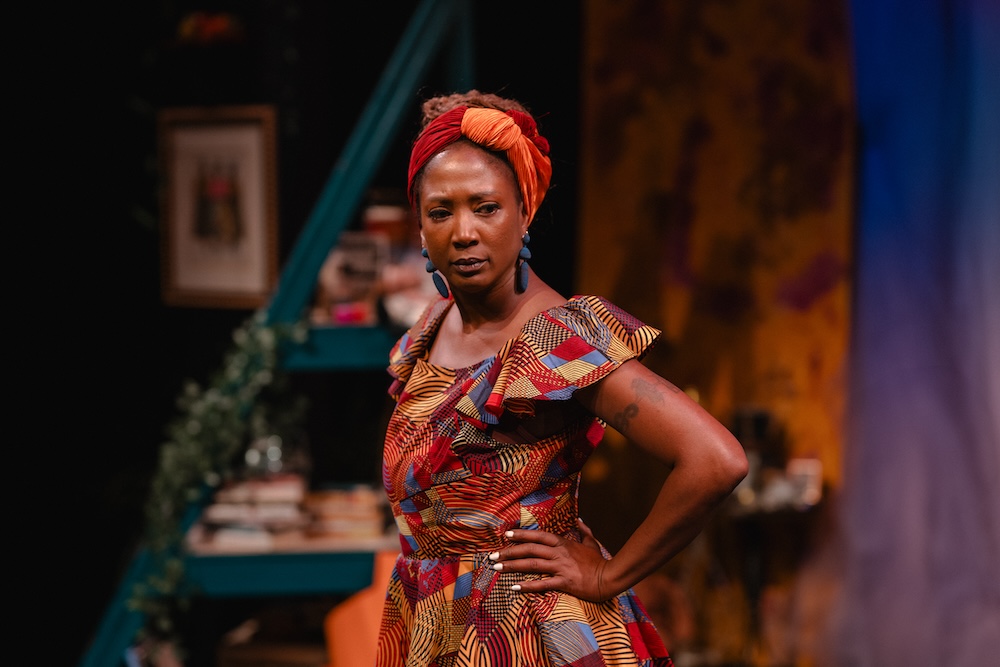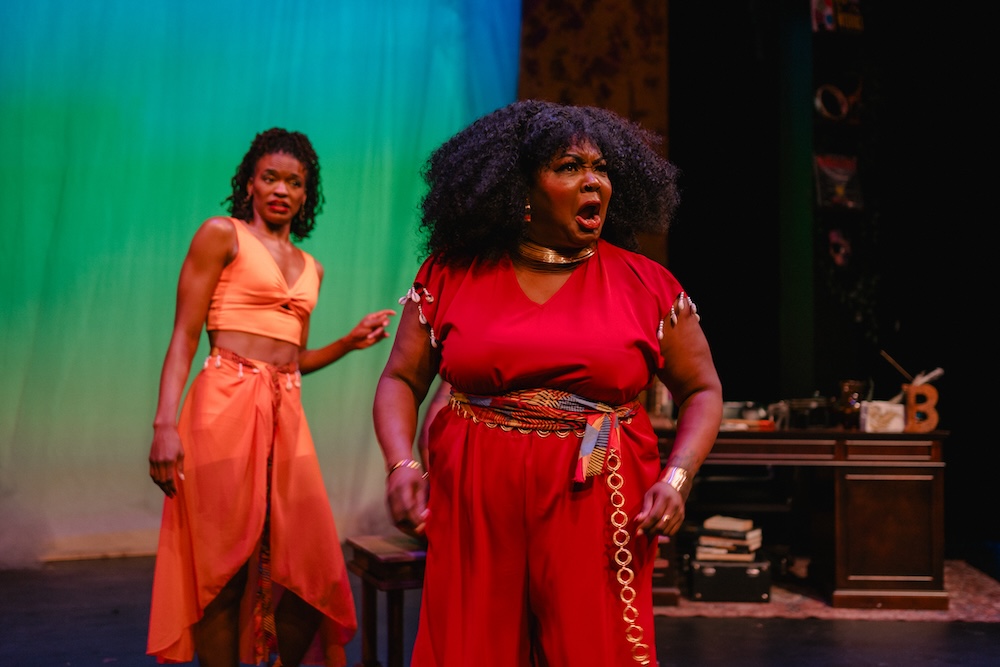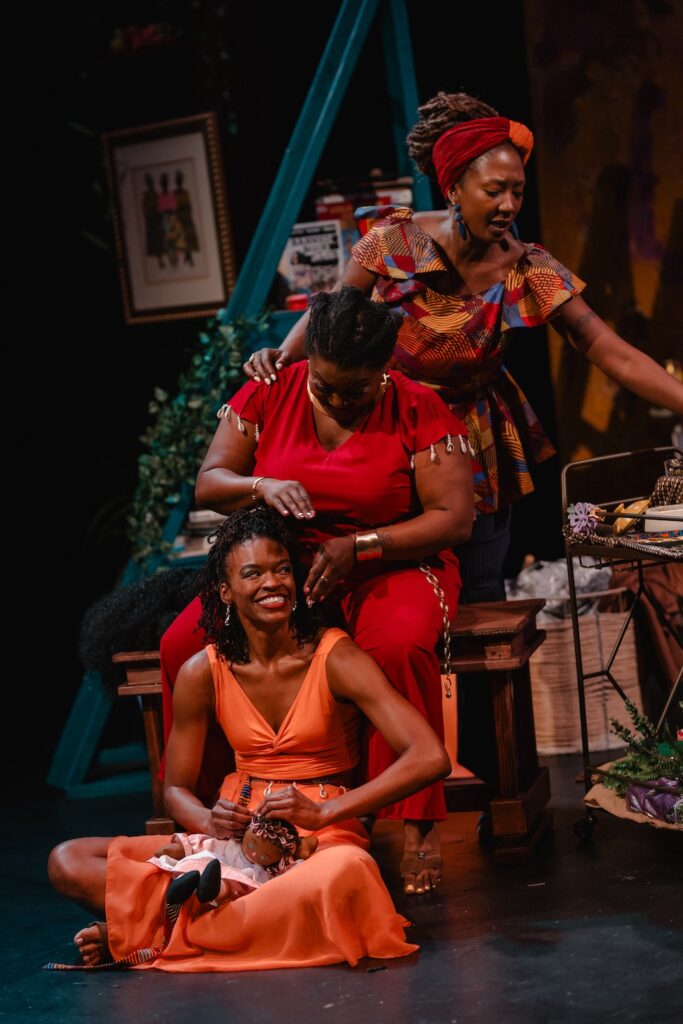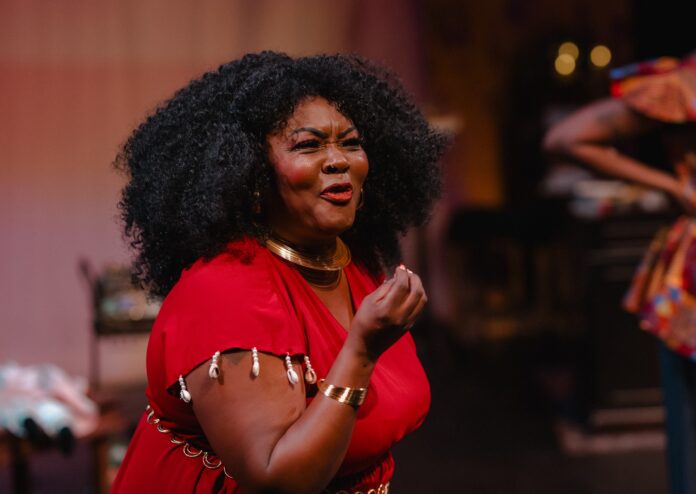The fact that I caught The Black Feminist Guide to the Human Body (runs through Sun/6 at Magic Theatre) for a Sunday matinée seemed appropriate. Not just because of the important role the church has played in Black American history (for better and for worse), but also because the majority of the crowd was composed of mature Black women who probably showed up at the theater after attending church that morning. What’s more, the show seemed to knowingly “preach to choir,” like a pastor delivering a sermon they know will elicit calls of “well!,” “mm-hmm!,” and “yes, Lord!” from the devout congregation.
Before we begin The Black Feminist Guide, we enter the boho loft of Dr. Beatrice “Bee” Free (Jacinta Kaumbulu). As designed by Brittany Mellerson, colorful fabrics hang from above, every square inch seems taken by a book, vinyl, picture, or tchotchke, and the good doctor’s desk is a cluttered mess of whatever papers aren’t strewn across the floor. As we enter the theater, she’s in the middle of a yoga routine. Paradoxically, the play proper begins with Bea telling us that she “can’t work in a disorganized house.”
Bea is a professor of Black studies at a Texas university (not unlike SF-born playwright Lisa B. Thompson, who serves the same role at the University of Texas.) She tells us she’s working on a magnum opus text entitled The Black Feminist Guide to the Human Body, because she’s “not getting any younger” and wants a comprehensive book regarding Black womanhood that’s often missing from library shelves.

Helping her (and hindering her) are two manifestations of her inner-self: Cee-Cee (Paige Mayes), her body, and Dee (Phaedra Tillery-Boughton), her soul. The three argue, joke, sing, weep, dance, and try to cover every conceivable topic one can regarding Black womanhood in the span of 90-some-odd minutes.
This can take the form of sitting in awe at the history Black grandmothers carry in their bones, even as they ponder how the elderly can die from a lack of attention the way infants do. It also takes the form of the academic Bea fearing death may be coming for her specifically, as academic Black women rarely reach advanced age—underlined by an in memorium for Octavia Butler, bell hooks, Audre Lorde, and others whose average age of death was mid-to-late 50s. Bea asks, “Is this what it means to be a Black feminist professor—revolutionize, then die at 56?”
Dee knows that Bea’s new obsession with death isn’t random, something she occasionally implores Bea to share with the audience. It doesn’t help that an uncaring healthcare system will instinctively disregard the concerns of Black women patients, due to stereotypes of hysteria and a mythical higher pain threshold than their white counterparts.
But this show isn’t all about morbid fascination. Even by acknowledging the role Bea has played in slut-shaming other Black women who “liv[e] in [their bodies] in a way you don’t approve of,” the goal (with the aid of CC and Dee) is to document transmuting that shame into pride, the pain into joy. The semi-interactive show wants a Black female audience to sing along with the ladies when they slide into “Betcha by Golly Wow” and shout with pride that they grew up with untenable nappy heads. (A push cart full of Black hair products produced nostalgic chuckles from those of us who can name nearly all of them—if you know, you know.)

At times, it seems as if Thompson’s academic side has completely taken over, the play taking on the timbre of a practiced lecture or political speech designed to elicit cheers at the right moments. Indeed, the pre-show curtain speech features show director-Lorraine Hansberry Theatre AD Margo Hall essentially reciting her mission statement as LHT’s leader: to strengthen the voices of femme-identifying Black women. To that end, LHT’s production of this “rolling world premiere” (of which SF is the final stop) can, at times, feel like a motivational tour for those who already believe.
Help us save local journalism!
Every tax-deductible donation helps us grow to cover the issues that mean the most to our community. Become a 48 Hills Hero and support the only daily progressive news source in the Bay Area.
I’d also be remiss not to mention that I saw this show less than 24 hours after catching Two Folds: A Siddhi Creative Double-Feature at ODC, a dance show tackling similar topics from the perspective of Indian women. (Both shows are told from decidedly cis-gendered points of view.)
But therein lies the reason Black Feminist Guide, Two Folds, and similar shows are necessary: They’re preaching to a choir that is typically ignored. The goal of the show is to be a 90-minute confirmation of the fact that the presence, opinions, and lives of Black women not only have validity—they’re invaluable. Thompson isn’t talking to hear herself speak (an easy temptation for a lecturing academic), but speaking to those convinced no one’s listening. Her academic credentials lend empirical substance to the emotional weight she brings to the trio’s arguments—which weighs heaviest when Bea finally reveals what Dee has been hinting at the entire show.
Though not many members of our near-full audience were masked, there seemed to be a good flow of air throughout the show. My Aranet4’s CO² readings peaked around 928ppm midway through the show, finishing down at 722ppm during the final bow—which has to be the lowest I’ve seen it at The Magic since I began measuring.

Lest anyone think I’ve forgotten, the work of Hall and her acting trio is strong throughout the runtime. Hall once again finds the Magic stage a fertile ground for her creativity (finely balancing the movements of the performers, whether moving or standing still), with Kaumbulu, Mayes, and Tillery-Boughton delivering the vivacious performances (and, in the latter’s case, singing voice) that those of us familiar with their work have come to expect.
Early on in The Black Feminist Guide to the Human Body, the ladies remind us that feminism is about gender equity, not superiority. (You’re thinkin’ of the patriarchy.) In that sense, the show’s unabashed preaching to the choir is exactly why it justifies its existence. The show finds no shame in treating Black women (and other folks) to an hour-and-a-half of lamentations about their bodies, only to love them all the more. That is, after all, the theme of its sermon being preached: no shame.
THE BLACK FEMINIST GUIDE TO THE HUMAN BODY rolling world premiere runs through Sun/6. Magic Theatre, Fort Mason Center, SF. Tickets and more info here.





